Are you looking for easy and fun ways to help encourage your toddler's speech development?
If so, you come to the right place. I'm going to go over some speech development facts and give you some fun and interactive ways you can help your child's language development.
How to encourage speech development
A toddler's speech development is one of the most exciting and worrying things about parenting.
In the time of social media, it's easy to fall into the trap of comparing your toddler's speech development with others.
You may be wondering if there are any toddler activities to encourage speech.
Research shows that young children need to hear about 21,000 words per day for optimal language development.
While that number may have taken your breath away momentarily, I assure you it's not difficult to achieve.
Luckily, there are many things you can do with your toddler to encourage speech, and they can all be pretty fun!
Speech development in toddlers
You can worry yourself sick reading through websites about how many words your child should be saying at certain ages.
I've read that an 18-month-old should be saying at least 20 words, but then I read the next article down and I'm told a child should be saying at least 6 words at 18 months.
And then, to top the confusion off, women in parenting Facebook groups are telling me they've been told an 18-month-old should be saying more than 50 words!
Here's the most reasonable official word on what a toddler's speech should entail, by age:
By 18 Months- Says several single words. (They don't need to be clearly spoken.)
By 2 Years: Says sentences containing 2-4 words.
By 3 Years: Can carry on short conversations using 2-3 sentences and can be understood by most adults.
Along with these speech development guidelines, it's important to note that receptive language (a child's ability to understand) is of equal, if not primary, importance in younger toddlers!
So, don't gauge your child's language development only on what they are able to say.
Now, let's get to the fun part! The activities! I'll be providing examples of what you can say during the activity to encourage your child's speech!
Toddler activities to encourage speech
1. Herb Grinding- I am a big hot tea drinker and my kids enjoy the scents and flavors of the herbs brewing, along with trying new teas. (Decaffeinated, of course.)
This is one of my personal favorite activities to encourage toddler speech. If there is something you just love, involve your child.
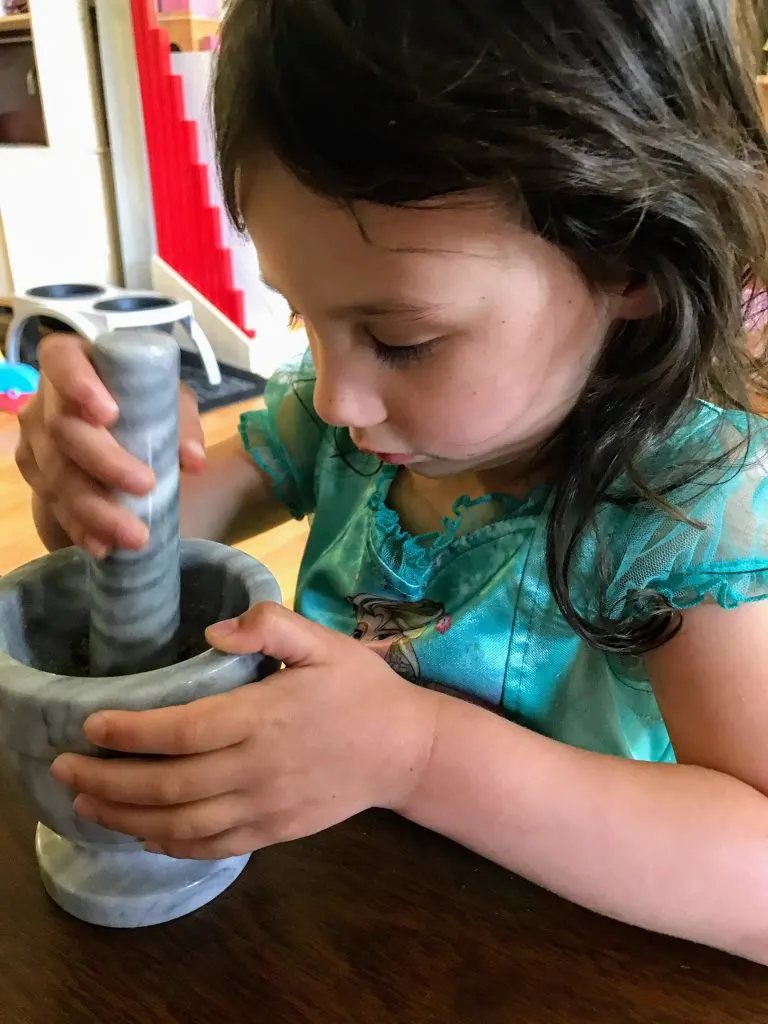
So, grinding herbs with a mortar and pestle is a super fun activity for us. And there is so much vocabulary that goes along with the activity!
“Feel the chamomile buds. They are dry and break easily. They should be easy to crush!”
“This is a mortar and pestle. People use it for all sorts of things! Painters use it to prepare paints, people crush medicine with it, and people use it for cooking. Let me show you how to use it. After we are finished crushing the chamomile, we can make some hot tea and put some honey and milk in it!”
2. Reading- This is crucial – and fun! Short, rhyming, and easy-to-follow stories are the best for a toddler's developing speech.
There is no need to purchase any of the “First 100” series books and drill your child on those words.
Simply read and let the story flow. If it's a rhyme, don't stop to talk about the story or the pictures for the first several reads through the book.
Let your child experience the rhythm of the syllables and the song of the rhyme.
This will enhance the experience for them, as well as encourage their love of reading in the future!
Even audiobooks have the benefit of enriching a child's vocabulary!
Sensory bins to help speech development
3. Sensory bins– While sensory bins are not Montessori, they are useful for a child's development.
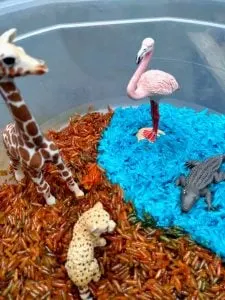
On top of tactile stimulation and as an adjunct tool for learning, they provide a fun opportunity for speech development.
Take this colored rice sensory bin, for example. We've made the brown rice the land and the blue rice the water.
My 2-year-old enjoyed coloring the rice, helping to plan the activity, and placing the animals in their respective habitats.
“Is water brown or blue? Hmm…I think it's blue. Let's put the brown land over to the left side of the bin and the blue water to the right of the land. Let's get your animals and try to figure out which ones live in the water and which ones live on land!”
So much language goes along with working with sensory bins. And you are only limited by your own imagination, as far as what materials to use!
4. Nature Walks- Take a walk around the yard, neighborhood, or local park. Stop often to observe the things around you.
Encourage your child to pick things up and offer a description of the item.
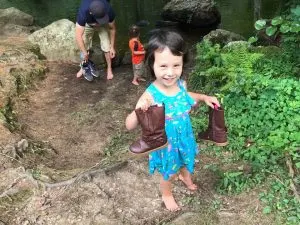
“Oh, look at that rock you found. Feel it. It's rough and has a jagged edge on one side. It looks different than the rock that I found. Mine is smooth. Do you want to feel it?”.
There is a lot of language to be shared when out and about in nature.
Encourage toddler speech through play
5. Blocks- This activity is so simple, yet so vital for just about every aspect of a child's development. Blocks. That's right, just plain old wooden blocks.
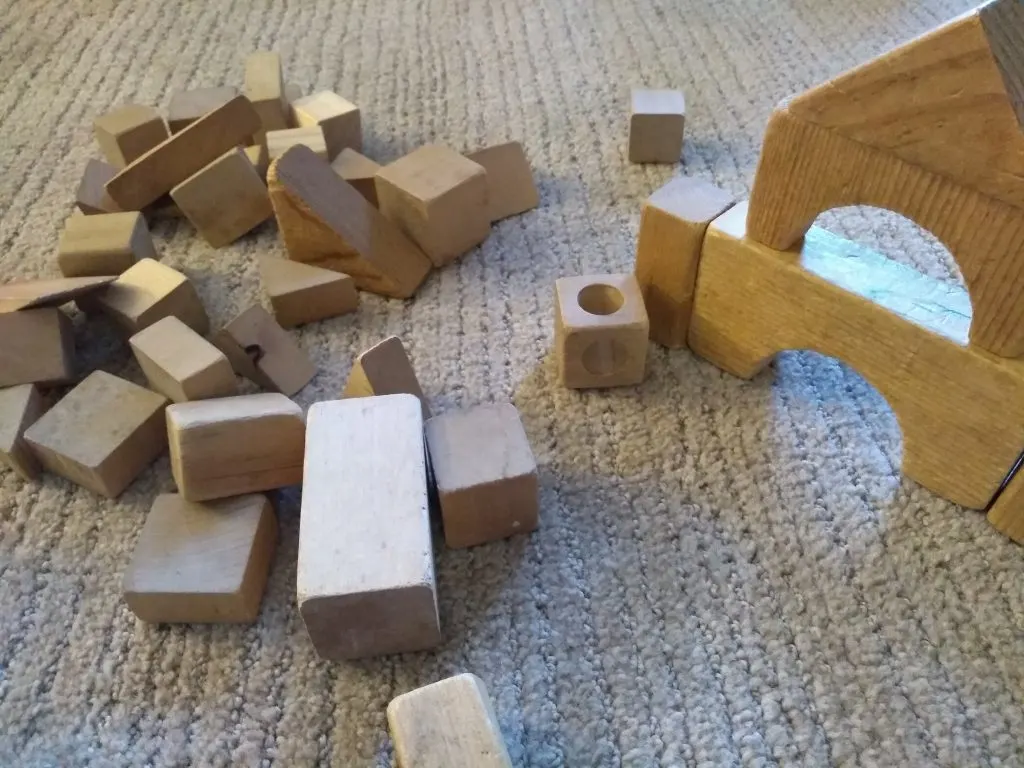
All you need to do is sit on the floor, facing your child, and build. Talk about what you're building and observe and admire what your toddler is building.
“I'm building a house. You see, the garage is right here and over here is the front door. I've turned a triangle-shaped block upside down to make a pointy roof. Show me what you are building!”
“Let's see how high we can stack these blocks! We can make a tower! Oh, wow, every time we add a block, our tower gets taller. If we keep building, we will have the tallest tower we have ever built!”
6- Miniature objects- Miniature objects are used for different things in Montessori. To start with, they can be used to help encourage speech development in Toddlers.
Language is best learned in conjunction with concrete, tangible examples. So, miniature objects provide this level of learning for toddlers.
Simply name the object and talk a bit about its use. Ask open-ended questions, even if your child can't answer.
Miniature objects are also great for sound games.
7- Silly Sounds- Show your child that it is fun to experiment and be silly with language by making silly sounds with them. Change the words to some common nursery songs and sing about what you are doing.
Instead of singing the correct words to “Twinkle, Twinkle, Little Star“, sing something like, “Beep beep, bop bop, bip bip, boat!” Just be silly!
Your child needs to see you feel free to experiment and be silly. This will help them feel free to do the same.
They will have fun, while getting practice and becoming more comfortable with trying new sounds. Activities to encourage speech can be silly and fun!
It should never feel like a lesson,
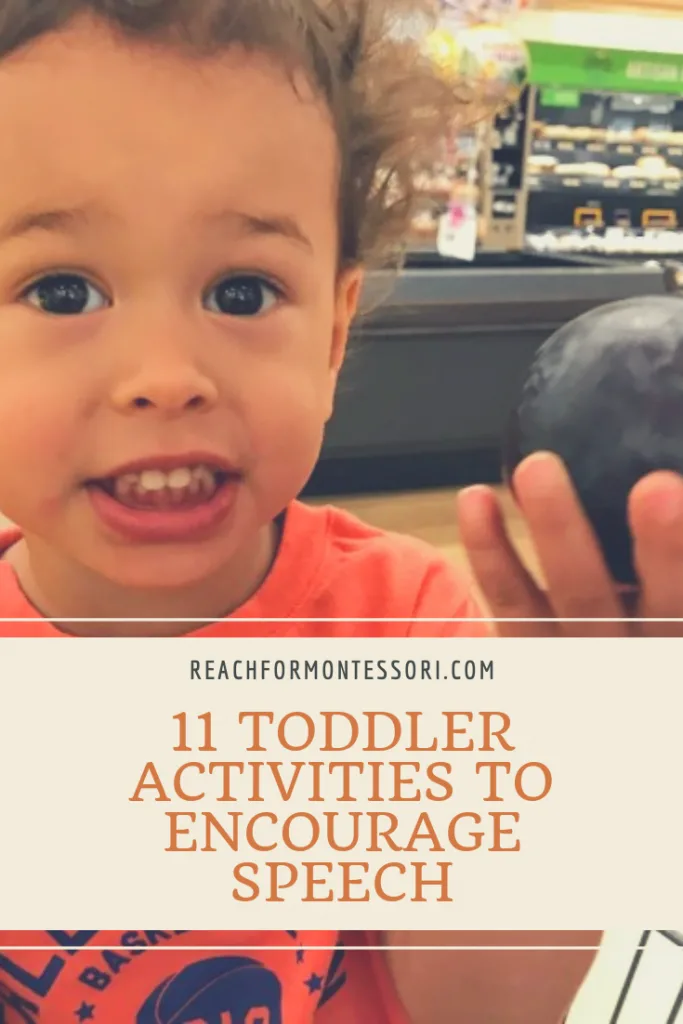
Speech development and music
8- Finger Plays- Finger Plays are songs involving the movement of the hands and fingers. This is a really fun way to encourage toddler speech!
One Finger Play all my children have enjoyed is this:
Open shut them (Open and close your hands in rhythm)
Open shut them
Give a little clap, clap, clap (Clap in rhythm)Open shut them (Open and close your hands in rhythm)
Open shut them
Lay them on your lap, lap, lap (Pat your hands on your lap in rhythm)Creep them creep them (Move your hands in a spider motion up your abdomen,
Creep them creep them toward your chin)
Right up to your chin, chin, chin
Open wide your little mouth (Tap your index fingers on the sides of your mouth,
But do not let them in close your mouth, and shake your head and wag your finger “no”)Shake them shake them (Shake your hands vigorously)
Shake them shake them
Shake them
Just like this, this, this
Roll them roll them (Ball your fists and roll your arms)
Roll them roll them Roll
And blow a little kiss (Blow a kiss to your child)
Muah!
Speech development and food
9- Grocery Shopping- Turn an adult chore into a fun activity by spending some extra time in the fresh section of the store.
The descriptive language that fresh food provides is amazing! There is so much to talk about at the grocery store!
Every fruit and vegetable has a different size, color, texture, scent, and flavor. Grocery shopping is probably one of the best activities to encourage healthy eating and toddler speech!
“We need some apples to snack on. Let's pick out 3 juicy red apples. 1, 2, an 3. Can you help put them in our bag? You did it! Now we've got 3 delicious red apples to snack on when we get home! Now, let's go see what else we can find!”
10- Cooking- There's no way around it. We have to cook.
So, instead of diverting your toddler's attention elsewhere so you can prepare dinner, invite them to help!
This is one of the most helpful ways to encourage toddler speech.
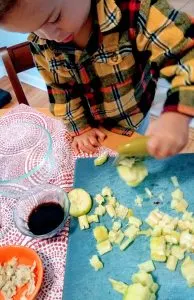
It may take longer (and more cleaning is sure to result), but the opportunity to help a toddler along with their speech development is missed when we exclude our children from daily activities, such as cooking.
“Smell this basil. I like the way it smells, don't you? Now, try a bite of this tomato. Mmm! It's so juicy, isn't it? Would you like to help me stir? Tomatoes and basil are going to be part of our dinner tonight! Thank you so much for helping!”
Speech development and picture books
11- Picture Books- Picture books are great activities to encourage toddler speech. They allow for more conversation, imagination, and they help develop critical thinking skills.
But for the purpose of this article, let's focus on the speech development these books promote.
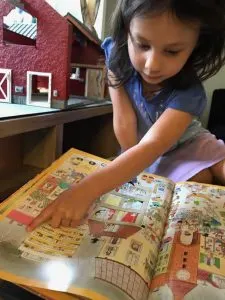
One of the great benefits of wordless books is the absence of words prompts conversation about the possible actions, emotions, and intentions of the characters on the page.
There is no story to read, so you and your child make up the story yourselves!
“That boy is walking a dog on a leash. I wonder where he is going. Let's see…there's a post office a few buildings away. Maybe he is going to pick up a package. I wonder who sent the package. Do you have any ideas? Maybe his grandmother sent it.”
These fun activities are sure to help get your toddler talking!
Turn off the TV to encourage toddler speech
Doing simple things like speaking clearly and limiting screen time are also important. A link between excessive screen-time and verbal delays has been shown.
Time spent in front of the TV or iPad is time lost gaining meaningful speech; speech that relates to your child's life.
Join Limited Screen-time Families on Facebook for more tips on screen-free activities. It's one of the best resources out there.
My personal experience with my children's speech development
As a mother of three completely different kids, I can promise you that personality plays a huge role in a child's speech development.
The tears I shed worrying about my first child's language development…It turns out, she is a quiet child and a bit of a perfectionist.
I couldn't help but worry when I would watch videos of all my friends' toddlers talking and singing when my daughter had a handful of barely discernable words and a whole lot of da-da-da. She was a “late” babbler, too.
Then, like a light switch went off, she started speaking full sentences.
Now, at 5, she has a vocabulary as large as any other kid her age.
My 3-year-old had 100+ words at 18 months.
He is more outgoing and willing to try to say words, even when he's unsure he's got the pronunciation just right.
He appreciates being corrected and will attempt a word as many times as necessary until he's got it just right.
Every child's speech development is different.
Basically, every child is different. So, try not to stress yourself (or your child) out about their speech development. Child development is not a competitive sport.
I can safely assume that you're reading this article because you have concerns about your child's speech development.
Take a deep breath, dry your tears, and have fun with these activities!
The MOST important thing, however, is that you listen. Your child may be saying more than you think!
And there is NO NEED to talk incessantly to your child, as many social media moms will claim!
Letting them develop confidence and concentration through independent play is absolutely vital.
So, let them play, then join them.
Let them explore, then join them.
There are so many activities to encourage toddler speech and their all fun!
Cheers and don't forget to subscribe!

Daynia
Wednesday 25th of August 2021
I NEEDED to read this. Thank you so much. Trust me... you are so right. I worry about my toddler's speech every single day. i am tired of reading articles. I am going to take your advice. Thank you Thank you Thank you.
Bit of crackling
Wednesday 30th of December 2020
If transitions are a problem for your child, it is important to figure out what about the transition is difficult. Often kids don’t like stopping an activity that they are enjoying (like playing on the computer) in order to do something less fun, like getting ready to leave the house. While no one enjoys stopping fun things, some kids struggle with it more than others. That can be a sign that they are still developing emotional self-regulation skills, but it is just one possible cause. Other children struggle to cope with unanticipated changes in schedule, or moving on from something that they feel like they haven’t finished.
GR
Thursday 21st of May 2020
thanks for this article! our little guy has pretty much no words at 15mo but understands what we are asking him to do and follows directions well. he has no screen time and we read a ton of books. the ped is already talking about early intervention speech therapy--ugh! this was such a reassuring article. thanks :)